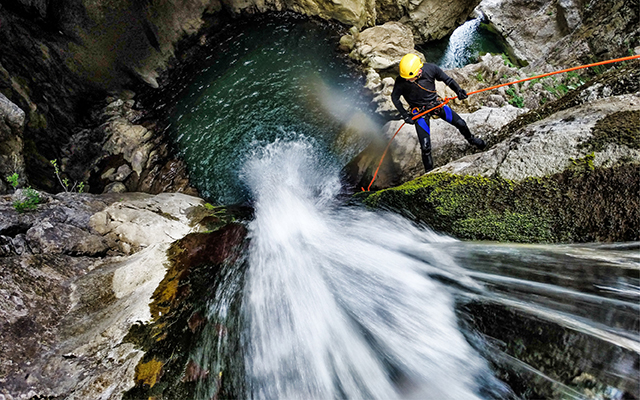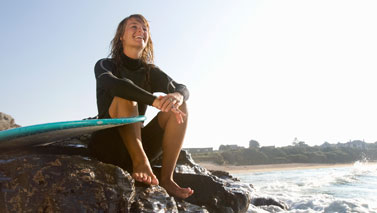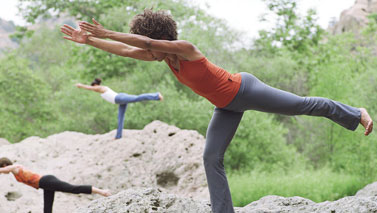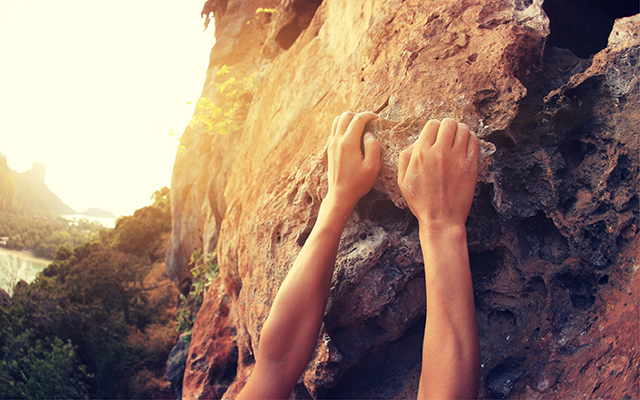Heart pounding. Thrilling. A rush. That’s how extreme-sports enthusiasts describe mountain biking down a rocky hillside at top speed, scaling a vertical rock face or skydiving. Those feelings are what keeps them coming back for more.
Ready to shake up your routine and challenge the adventurer within? A new breed of thrill-a-minute outdoor sports mixes traditional activities and adds cutting-edge gear for a wild concoction of hang-onto-your-teeth experiences guaranteed to get your heart racing. Think kiteboarding in Oregon, coasteering in Wales and canyoneering in Utah.
For first-time adventurers, trying an extreme sport like these may be intimidating, but venturing out of your comfort zone ramps up your personal fun quotient, satisfies your urge to explore and offers a rugged new fitness challenge. If you join an introductory excursion with an outfitter, you’ll get expert coaching and benefit from their knowledge of the local terrain. You’ll also sample an activity’s thrills without investing in expensive equipment — until you’re sure you’ve discovered your athletic calling. (For more on sports-immersion getaways, see “Dare to Dream” in the October 2009 archives.)
These adventures don’t come without risks, however, so check an outfitter’s experience and ask about safety measures — especially how they handle emergencies — before you go. (Be prepared: Outfitters require you to sign a legal waiver releasing the company and its guides from liability in case of injury or death. This is often the trip’s most stomach-churning aspect — because the fun hasn’t started yet.)
Here are three up-and-coming, adrenaline-packed sports that will challenge you physically and mentally — and leave you feeling everything but in a rut.
Kiteboarding
What you do: A combo of surfing, wakeboarding and kite flying, this breathtaking sport involves riding a board and jumping into the air while a kite pulls you over windy lakes, rivers or the ocean.
Gear: The outfitter provides a kite with harness and control bar, board with footstraps, life vest, and helmet. You wear a swimsuit, wetsuit
(optional), sunscreen and sunglasses.
Fitness requirements: Strong swimming skills, above-average core and lower-body strength. Board experience a plus.
Where to go: Maui; Hood River, Ore.; La Ventana, Mexico; Cape Hatteras, N.C.; Tarifa, Spain; Miami, Fla.
Fighting off panic, Gavin Morrison steered his kite into the howling wind and sliced through the chilly waters of the Columbia River. The waves pounded his board as his crossbow kite powered him over the whitecaps — and then he crashed. Moments later, instructor Jim Bison of New Wind Kiteschool in Hood River, Ore., buzzed by on his Jet Ski and gave Morrison some pointers.
“Kiteboarding is a midlife-crisis sport for me,” says Morrison, 45, a Boise, Idaho–based physical therapist. “I was plodding through average, everyday life doing my job, caring for my family and paying the mortgage,” he says. “Kiteboarding gave me new energy.”
And no wonder, says Aaron Sales, editor of Kiteboarding Magazine, a publication dedicated to the 12-year-old sport. “When people watch a kiteboarder jump 40 feet off the water and soar through the air pulled by their kite, they’re mesmerized,” Sales says. “Harnessing wind power to ‘fly’ gives you a superhuman feeling.”You don’t have to be particularly muscular to hold down the kite; it’s harnessed around your waist, so your body weight counters the kite’s power, not your arms. First, you’ll start learning to skim across the water — a skill that takes just a day or two to grasp. Once you’ve got the basics, you can graduate to jumps.
“Find a good instructor to teach you to judge weather, find safe locations and check your gear function,” advises Sales, noting that new kite technology has made kiteboarding safer than ever. On an old board, you’d be dragged through the water by the kite if you wiped out. Crash with one of the new ones, though, and you can simply release the steering bar, causing the kite to “de-power” and fall into the water.
And then there’s the thrill factor: “The first time the kite pulled me 20 feet on the board, I thought, Wow, that was amazing!” says Morrison. “Going out on the water for an hour feels like only 10 minutes, because I’m having so much fun.”
Coasteering
What you do: Swim, dodge waves, scramble onto rocks and jump from cliffs in spectacular coastal area
Gear: The outfitter provides a wetsuit, flotation vest, gloves and helmet. You wear a swimsuit and rubber-soled shoes.
Fitness requirements: Swimming skills, confidence in water and the ability to climb wet rocks.
Where to go: Britain (Wales, Cornwall, Devon); Northern Ireland; New Zealand.
In her neoprene wetsuit and life jacket, Syracuse University student Laura Kelly stood at the top of a craggy cliff on Wales’s west coast contemplating the churning seawater many feet below. A few others in her coasteering group were already whooping and bobbing in the ocean after their dramatic plunge. “I wanted to get it over with,” Kelly recalls. “I’m not a fan of stomach-lurching drops.”
On that frigid February afternoon five years ago, Kelly wondered why she’d let friends talk her into Preseli Venture’s “Adrenaline Cocktail” coasteering and sea kayaking weekend during their semester abroad. And then she jumped.
“Falling felt like slow motion, but once I hit the water, it was awesome — definitely the coolest, most daring thing I’ve ever done,” Kelly recalls. Her coasteering experience, which also included swimming and hoisting herself over wet boulders, awoke her inner warrior. “The freezing waves bashed me into a rock,” she says. “I had a huge bruise on my leg for weeks; it was my battle wound!
“Coasteering is a real buzz,” says Claire Carlile, marketing manager for Preseli Venture, which operates in Wales’s Pembrokeshire National Coastal Park, where the sport was invented 20 years ago. “There are rocks to traverse, sea caves to explore and huge ocean swells that lift you up, then drop you.” But don’t try cliff jumping without an expert. “In Pembrokeshire we have a 7-meter tidal range, so jumps that are safe at high tide aren’t at low tide.”
Kelly, a 26-year-old New York PR account executive, reflects often on her coasteering experience. “Our guides made sure we were safe, but they let us do the scary stuff on our own to prove to ourselves we could do it,” she says. “I’m still amazed: I went coasteering. In Wales. In February.” For her next vacation, Kelly hopes to go ziplining. “After jumping off a cliff,” she says, “I’m much more willing to try new adventures.”
Canyoneering
What you do: Hike, climb rocks, wade or swim, rappel, and navigate through narrow canyons.
Gear: The outfitter provides helmet, harness and rope, canyoneer shoes with wet/dry grip, wetsuits or coveralls, gloves, self-drain backpacks, and dry bags. You wear pants, shirt and a hat.
Fitness requirements: Hiking and stability on varied terrain; ability to carry a 20-pound pack for several hours a day.
Where to go: Canyon-filled desert plateaus in Utah, Arizona, New Mexico, Colorado and California.
Before getting hooked on canyoneering, Leigh Waggoner’s ideal vacation was viewing landscape paintings in art museums. Now the 40-year-old accounting instructor from Cookeville, Tenn., enjoys the rippled red-rock scenery of Utah’s Zion National Park while rappelling down steep canyon walls and squeezing through narrow slots in the earth.
“When my husband suggested canyoneering four years ago, I agreed to go only if we got lots of instruction,” says Waggoner. The couple enrolled in courses with Zion Adventure Company in Springdale, Utah — and she discovered a new side of herself. “I never dreamed I had the stamina or strength-to-weight ratio to do adventure sports,” she says. “Canyoneering helped me realize I love being athletic and outdoors.”
Zion Adventure Company founder Jonathan Zambella isn’t surprised. “Our half-day introductory courses are designed to help people go from ‘never-ever’ to ‘I just did it!’” he says. That’s part of the appeal of this sport, which exploded in popularity during the 1990s.
Most hikers who are able to negotiate rocky terrain can canyoneer, and they can explore many locations simply by hiking, scrambling and wading. Zambella recommends taking a course to learn the necessary technical skills, or hiring a guide who knows safe routes and can spot warning signs of rock falls and flash floods. Other canyon trips require rope skills and rappelling, taught by a professional.
Waggoner, who’s not afraid of being suspended from a rope, admits that her greatest challenge is the cold. On 100-degree summer days, a narrow canyon’s bottom is much cooler, and standing water that never receives sun can be 35 degrees. “Once our group rappelled right into a deep pool,” she says. “There was a risk of hypothermia even swimming in a wetsuit.”
But well-managed risks don’t dissuade her. “Zion Adventure’s safety-first approach to canyoneering gives me access to untrammeled, peaceful landscapes I’d never see otherwise,” she says. “It also provides pinnacle life experiences and the freedom for me to explore my physical side.”
Rev up your adventurous side by test-driving a new adrenaline sport like these. Adding a touch of derring-do can add spark to your vacation — and your life.
The Action Pack
Other high-adrenaline sports sure to get your heart pumping:
Ice climbing. Ascending ice formations — often frozen waterfalls or ice-covered cliffs — using rope systems, crampons and ice axes.
Paragliding. Harnessed to an inflatable wing, the pilot runs off bluffs, hills or mountains and glides on air currents.
Snowkiting. Like kiteboarding but on snow, a skier or snowboarder straps into a kite to skim across flat powder-fields and frozen lakes or up hills.
Waveskiing. Combines surfing with kayaking. The wave rider is seated on a modified surfboard and turns using a paddle and body movement.
Windsurfing (or sailboarding). Riding or planing across water on a board rigged with a sail. The surfer stands and turns the sail into the wind.
Extreme Resources
Outfitters and resources who can test your outdoor-adventure limits.
American Canyoneering Association: This nonprofit promotes canyoneering safety and training. www.canyoneering.net
“Intro to Kiteboarding”: Kiteboarding magazine’s free online guide to getting started, gear, wind forecasting and more. www.kiteboardingmag.com
Preseli Venture: Leads coasteering, sea kayaking, mountain biking and surfing in Wales. Endorphin Blaster coasteer: Half-day £55 ($90); full-day £105 ($173). Adrenaline Cocktail weekend: £199–£210 ($325–$345). www.preseliventure.co.uk
Zion Adventure Company: This canyoneering outfitter organizes trips in Utah’s Zion National Park for ages 5 and up. One-Day Basic group course (includes gear and training): $199 per person. (435) 772-1001; www.zionadventures.com




This Post Has 0 Comments